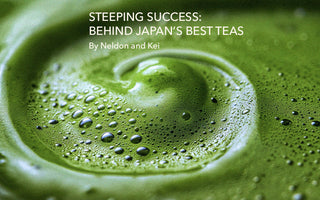Japanese Green Tea and Health Blog

At Japanese Green Tea Co., we're committed to delivering 'wow moments' to our readers. As part of our mission to become the most comprehensive and accurate Japanese green tea resource on the planet, we've created a blog that not only explores the profound health benefits of green tea but also dives deep into its cultural significance. We're passionate about green tea and aim to deliver awe-inspiring content, inviting you to delve into articles highlighting the beauty and intricacies of varieties like Matcha. Immerse yourself in our blog, share in our love for this unique brew, and let us guide you through an enlightening journey into the heart of this age-old tradition.

Yokohama Peach is offered as a regular menu at Okayama Kobo Cafe! + Recap Video of Pop-up on 2/8/2026 at Anaheim, CA
We are excited to announce that our Yokohama Peach is now available on the regular menu at the popular Japanese Bakery, Okayama Kobo! Check out their bakery and hosted events,...

Behind the Scenes – How We Made the Event Booth & Backdrop Using Sacred Wood
Discover how our one-of-a-kind event booth came to life—from Japanese Kōshi (格子) design and rare Port Orford Cedar to more than six months of craftsmanship and refinement.

Hojicha Banana Daifuku (Mochi): The Collaboration of Aromatic Roasted Tea and Richly Sweet Banana
Dive into the soft, chewy world of Hojicha Banana Daifuku—where toasted tea meets sweet banana in a cloud of fresh mochi. Discover why everyone’s craving this treat!

Why Japanese Green Tea is Perfect for Intermittent Fasting + How to Guide, What to do & What not to do
Intermittent fasting is becoming increasingly popular. Because there are no restrictions on what foods to eat or limit, it is more of a lifestyle pattern than a diet. This article...

Introducing Osaka Honey (大阪ハチミツ):A Cozy Japanese Honey -Tea Blend
Discover how Osaka Honey blends mellow Japanese black tea and honey powder into a daily ritual that brings calm, flavor, and mindful luxury to modern life.

Matcha Package Design Contest Result.. and the Winning Product is Available Now!
Five months, countless iterations, and your votes brought this matcha package to life—a fusion of washi(和紙), kiri(桐), and kinpaku(金箔). See the masterpiece you helped create.

Hojicha Almond Daifuku (ほうじ茶アーモンド大福): a Calm, Toasty Twist on a Beloved Classic
A modern twist on tradition—Hojicha’s warm aroma meets creamy almond in the delicate Hojicha Almond Daifuku. Taste Japan’s comfort in every bite.

Exciting News: We Acquired the History of Katana YouTube Channel!
Welcome to the famed History of Katana YouTube Channel—unlocking rare stories, epic blades, and what comes next. Curious? Dive into the reveal. Learn more.

Wa Modan Style: How Japan’s Modern Aesthetic Inspires Buildings, Sweets, and Drinks
Discover how a tropical coconut‑green tea dessert whispers the spirit of ‘wa‑modan’ — where tradition meets trend in every bite. Want to taste the fusion?

OC Japan Fair Fall 2025 Recap (October 17 - 19 2025)
We were thrilled to return to OC Japan Fair 2025—the biggest Japan-themed event in SoCal! Here is a recap video from the event!

Totoro & Japanese Green Tea + Our Secret Edible Makkuro Kurosuke Recipe!
Delve into the enchanting world of Studio Ghibli films, Shinto traditions, and the calming ritual of Japanese green tea in this cultural exploration.

Yerba Mate Tea (マテ茶) vs Japanese Green Tea
Yerba mate vs Japanese green tea: which drink gives the energy, antioxidants & ritual that fits your mood? Uncover the surprising truths—and taste the ritual.

Japanese Green Tea vs Vietnamese Tea
Japanese vs Vietnamese green tea: discover which wins in flavor, culture, health—and why each sip tells a story. Which side will surprise you the most?

LB Sake Day 2025 Recap at Long Beach, CA by Sake Secret 9/6/2025
We had an amazing time at LB Sake Day 2025—sake, history, and surprise tastings at our booth! 🍶🍵Catch the highlights and get ready for 2026 →

Introducing New Package for Benifūki Allergy Relief Japanese Green Tea Bag
Discover the story and design behind our new pink Benifūki Allergy Relief Tea Bag package—crafted by Miki Pon and inspired by the tea’s unique heritage.

Designing packages of Tokyo Peppermint and Yokohama Peach by Miki Pon
Meet Tokyo Peppermint & Yokohama Peach! Sweet teas meet bold design by our Chief Design Officer, Miki Pon—get the behind-the-scene story and interview of Miki

Maum Market at the Enclave, Torrance CA - July 19 2025
Watch a recap video from July 19 2025 MAUM Market at The Enclave in Torrance! Thank you to everyone who stopped by!

Kiriko, Portland Carries Our Tea – Inspiration from Our Hometown
Discover how Kiriko Made, a Portland gem blending Japanese heritage and craft culture, now features our premium green teas in their shop & new kitchen shop, Kokoro!

Maum Market at OCMA June 28 2025
We were back at MAUM Market at OCMA on June 29 2025! Thank you for everyone stopped by! Check out a short recap video of the event.

Everything You Need to Know about Tea Plant
Learn about cutting, trimming, & pruning techniques at Japanese tea farms. These practices promote healthy growth & high-quality tea leaves. From shading to harvesting, discover the secrets behind delicious green...

Chabana 茶花– Importance of Flower Arrangement (Ikebana) in Japanese Tea Ceremony
Immerse in Japan’s tea ceremonies! Discover how elegant flower arrangements entwine tradition and aesthetics, creating a serene harmony of beauty and ritual.

Behold: Balmuda's "The MoonKettle" — Where Boiling Water Becomes Art
We were privileged to be invited by Balmuda's Private MoonKettle Launch Event. Here are videos of it and everything you need to know about the new MoonKettle!

Everything You Need to Know About Different Types of Japanese tea
Discover the diverse world of Japanese tea. From sencha to matcha, explore the flavors and traditions that make each type unique. Expand your tea horizons and savor the essence of...

🌞 Summer Market at Bread and Salt – San Diego! 6/1/2025
We had fun time at Bread and Salt in San Diego for a summer market filled with vinyl, yakitori, green tea, and Japanese vibes!

Steeping Success: Behind Japan's Best Teas - By Neldon and Kei (Live Recording)
Curious about Japanese tea? Watch my candid livestream with tea blogger Neldon as we dive into matcha, myths, and winning global tea awards.

Major Japanese Tea Manufacturers in 2025 and the Best Sellers
Discover the top Japanese green tea producers in 2025. This detailed guide delves into the rich history and distinctive mixes of famous brands.

What is Shincha Tea and What Makes It Unique?
Discover the secrets of Shincha, Japan's acclaimed new crop tea. Explore its distinct features, flavors, and traditions. Learn what makes Shincha a must-try for tea lovers. Immerse yourself in the...
